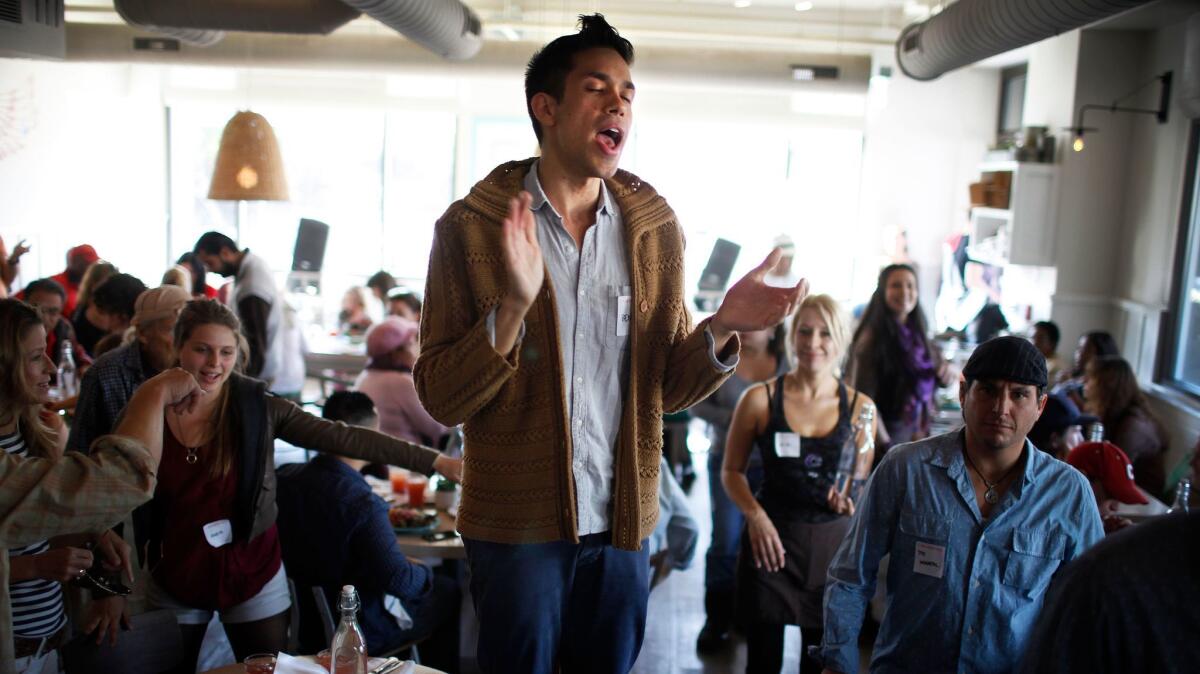Op-Ed: Can’t vegans and vegetarians just get along?

- Share via
People whose ideologies are close but not identical often seem to hate each other the most. Consider the quarrels among various brands of progressives captured in the phrase “the left eats its own.” Freud called this phenomenon “the narcissism of small differences.” Recent research has referred to it as “horizontal hostility,” which grows as a reaction to “distinctiveness threat.” The distinctness under threat is differentiation from mainstream groups, a differentiation that minority groups usually value as part of their identities.
Psychologists have studied this dynamic among strict vegans and less-strict vegetarians, finding that vegans often were more hostile toward vegetarians than they were toward meat eaters. The researchers assumed this was about identity protection — when vegans, vegetarians and flexitarians (who avoid meat and dairy but aren’t absolutists) are lumped together, the vegan identity gets diluted by association.
It’s not hard to figure out why identity dilution would bother principled vegans. For starters, it leads to confusion and inconvenience. Vegans may be offered chicken, fish, eggs and dairy by family and friends because flexitarians (and sometimes even vegetarians) eat these things.
Another concern seems to be that flexitarians and vegetarians might be getting as much moral recognition as vegans, even though vegans’ actions are more in line with the ethical code — don’t harm animals — that all of these groups claim to follow. Of course, the average meat eater does even less to help animals than the average vegetarian, but meat eaters don’t claim any virtue points for their meal choices, nor do they threaten the vegan identity. In fact, they help strengthen that identity, and so they escape any wrath motivated by these concerns.
Psychologists have studied the dynamic [between] vegans and vegetarians, finding that vegans often were more hostile toward vegetarians than...meat eaters.
Horizontal hostility also can arise when people are exposed to the same information but arrive at different conclusions. If this information inspires life changes for some, it can seem to those people that anyone unexposed to the information is relatively blameless in contrast to those who are exposed but do not change. I know a meat eater who dated a vegan activist. Early in their relationship, the meat eater asked the vegan why he was willing to go out with her. He responded that she was OK because she didn’t know the horrible truths about animal farming; it would be different if she kept on eating meat after her eyes were opened.
Horizontal hostility makes sense psychologically, but for those fighting for animals and against factory farming, it’s a strategic disaster. It leads to infighting among people with overlapping goals, and therefore it’s counterproductive. Just about everyone who reduces consumption of meat, eggs and dairy for ethical reasons wants to see the end of factory farming. Yet we waste time by focusing on things like virtue points and identity shoring, and disputing each other’s visions of the ideal post-factory-farming landscape.
In “Obligate Carnivore: Cats, Dogs and What It Really Means to be Vegan,” Jed Gillen wrote about how his pet store was boycotted by fellow vegans because he sold a flea remedy that contained flea extract. To Gillen, the boycott was perverse because anyone not shopping in his store was probably supporting mainstream pet stores, which undoubtedly committed bigger transgressions. But it’s possible that Gillen’s protesters thought they were acting strategically. They knew that if they were to boycott, say, Petsmart over flea treatment, the company would not notice. Gillen, on the other hand, whose store was, in his words, “at worst, 99.44% vegan,” might actually listen to concerns about insect exploitation.
By extension, vegans may think that vegetarians and flexitarians will be more receptive to the vegan pitch, leading them to spend time debating their fellow travelers instead of focusing on the public at large.
However, as a flexitarian myself, I think they’re wrong. I’ve considered the arguments for veganism and that’s why I’ve decided that reducing animal products from my diet is a good way to start making a difference. I advocate for pragmatic “reducetarianism” — regular, considered cutback in the consumption of animals and animal products. I may commit to veganism at some point, but it won’t be the result of someone telling me to go vegan.
I’m not suggesting that hard-liners should stop caring about ideological purity and consistency. Those of us fighting against factory farming cannot be an inclusive movement if we say “only pragmatists allowed.” Some animal activists simply won’t be able to abide just making incremental progress for animals. For them, anything less than veganism is in conflict with the goal of abolishing the consumption of meat and the use of animal products. But whether you’re practical or ideological, you can accomplish more by reaching out to meat eaters who have never thought to question animal farming than to people who have considered the issues and chosen an approach that is not identical to your own.
Vegans, vegetarians and flexitarians may never fully agree on principles and tactics. At the same time, we will always have overlapping concerns, and those should be our central focus. “Reducetarian” is an umbrella identity for all who consciously curtail their animal-product consumption. Adopting this broad identity allows us to concentrate not on our differences but on our shared commitment to ending the factory-farming industry.
Brian Kateman is president of the Reducetarian Foundation and editor of “The Reducetarian Solution: How the Surprisingly Simple Act of Reducing the Amount of Meat in Your Diet Can Transform Your Health and the Planet,” which will be published in April.
Follow the Opinion section on Twitter @latimesopinion and Facebook
More to Read
A cure for the common opinion
Get thought-provoking perspectives with our weekly newsletter.
You may occasionally receive promotional content from the Los Angeles Times.









